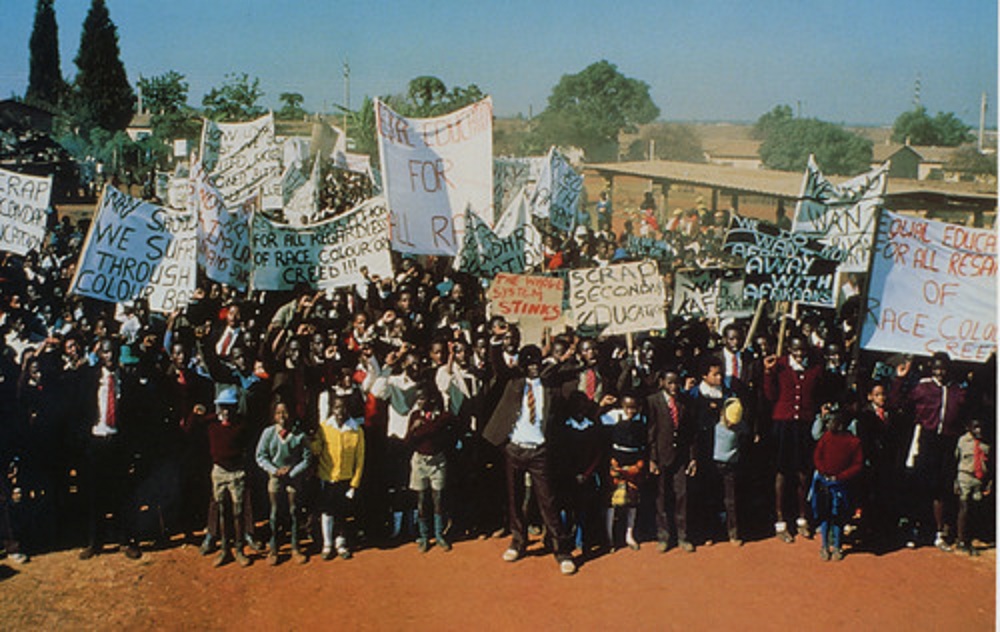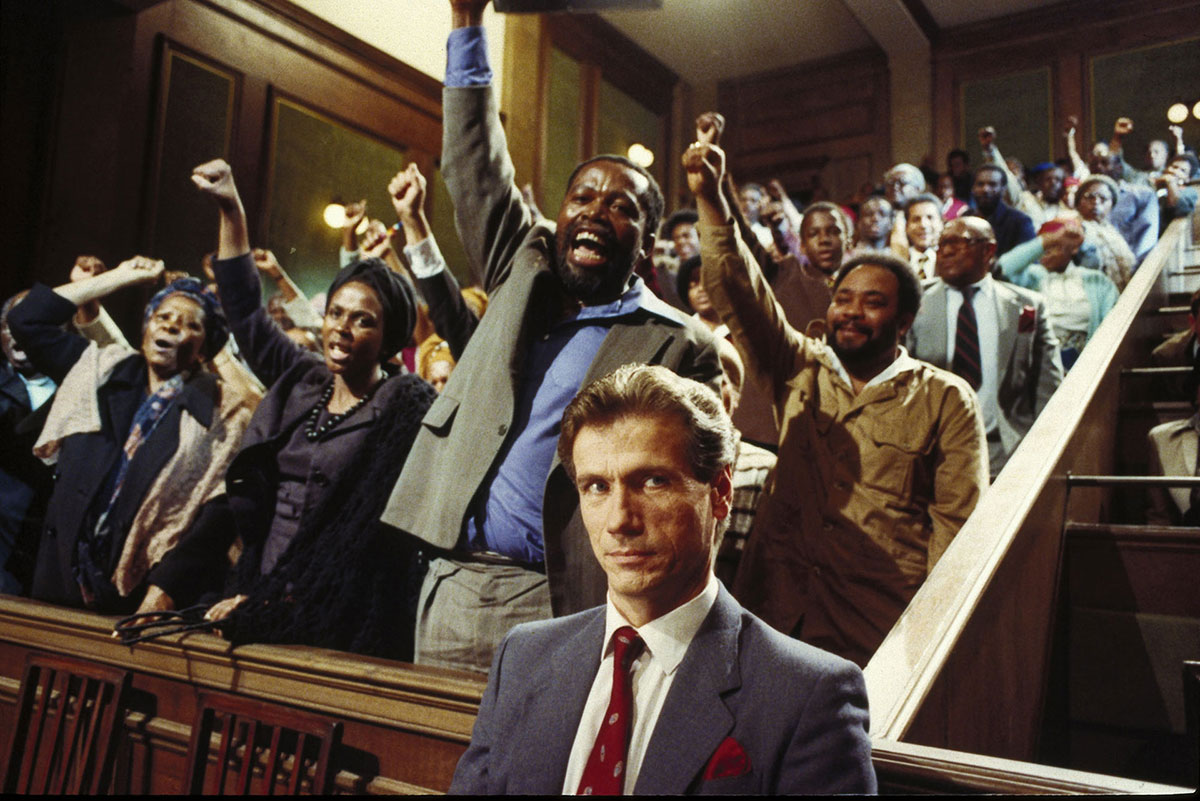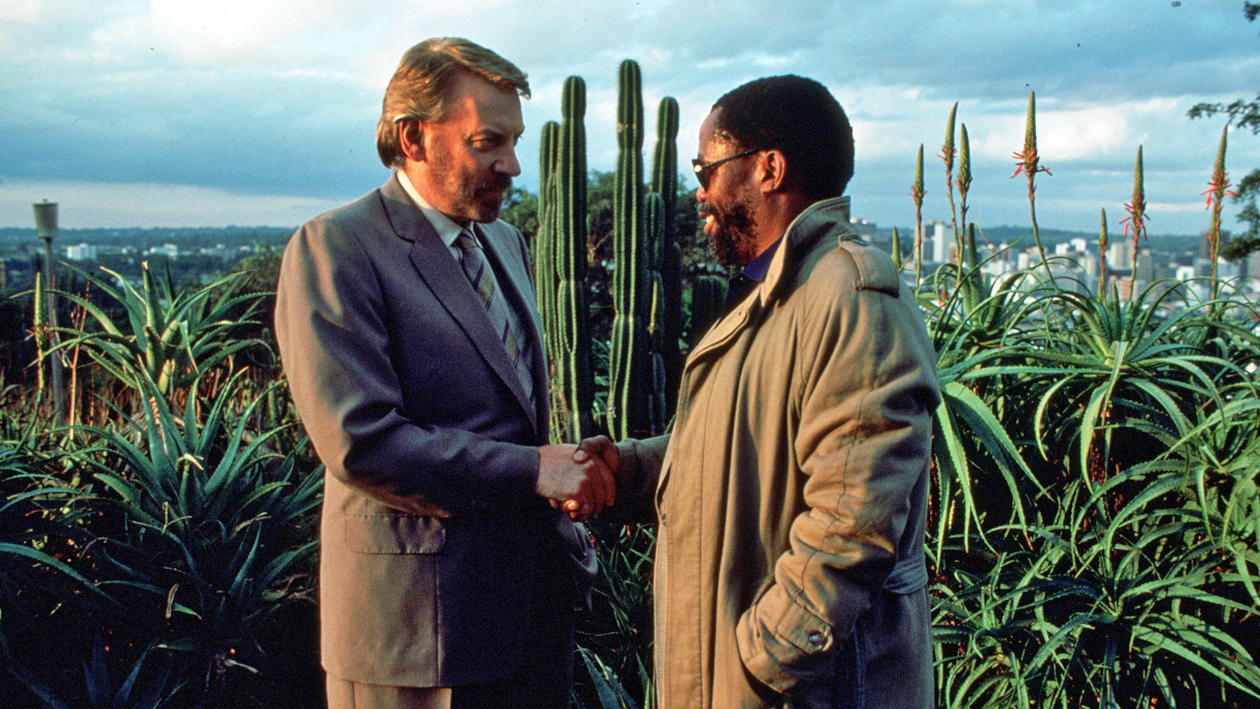This guest post written by Shara D. Taylor appears as part of our theme week on Women Directors.
Young, Black people take to the streets to peacefully protest unequal treatment. Officers in military gear face them in battle formation and order them to disperse. The protestors sing in unity, refusing to cower at the threat. The officers indiscriminately shoot canisters and bullets into the crowd and begin beating anyone within striking distance. They unleash dogs and wield batons against the backs of Black residents as helicopters whiz overhead. After the tear gas clears, parents find their little ones and shuffle them into safer quarters.
This could be a recent description of the streets in Ferguson, MO, Baltimore, Chicago, or another U.S. city where Black Lives Matter activists have fought against police brutality and harassment.
But, it is not. It is a breathtaking scene from Euzhan Palcy’s seminal film A Dry White Season (1989).

Set in South Africa in 1976 during the reign of apartheid, it stands as a testament to the continuous assault on Black lives around the globe. The story reflects Black South Africans’ struggle for freedom from a system that devalues and maims them with impunity. As the first Black woman to direct a film for a major studio, Palcy handles her subjects with such care and reverence that it becomes impossible to ignore their modern incarnations.
Scenes of everyday life punctuate the film. Black residents escape reality by drinking beer in crowded dining halls, as white residents play rugby in lush green fields. Black folks resist the heavy hand of a corrupted justice system, while white people roll around in well-manicured lawns with their babies.
Their lives touch in an uneasy social stratification that allows them to intersect without intermingling. Even as Black domestic workers toil in the homes of white families, their lived experiences exist on the periphery of their employers’ purview.
Gordon Ngubene (Winston Ntshona) works as a gardener for Ben du Toit (Donald Sutherland). When police cane the buttocks of Ngubene’s son Jonathan (Bekhithemba Mpofu) and leave deep wounds without cause, du Toit’s response is telling: “They must’ve had a reason.”
It never occurs to him that a system set in place to protect him would abuse its authority. It is easy to imagine him responding “all lives matter” to “Black lives matter.” His worldview rests comfortably in the idea that Black people always make trouble for themselves. Any other explanation upsets his blindly privileged life.
Concerned about his son having a criminal record, Ngubene turns to his employer for help. Du Toit asks the boy if he clearly explained his situation to the court. When Ngubene reminds him that Jonathan is merely a child, du Toit dismisses it as a “minor matter” and offers treatment for his physical wounds. It again becomes apparent that du Toit lacks the socio-political awareness that would give him pause at such a troubling offense.
Du Toit’s 21st Century American contemporaries likely would label Jonathan as a “thug” who “got what he deserved,” in much the same way they have shown their contempt for Trayvon Martin and Michael Brown. Indeed, du Toit’s houseguest goes unchecked for referring to Black children as “bloody savages.” His wife Susan (Janet Suzman) quickly changes the subject as the family gathers for a meal. All the while, Jonathan and du Toit’s son Johan (Rowen Elmes) absorb the messages of their fathers, all but ensuring a perpetual cycle of black oppression and white obliviousness.
During the earlier-mentioned protest, Jonathan goes missing at the hands of police. Officers deny having a record of his arrest. This sends his father on a mission to find him. Ngubene and his wife Emily (Thoko Ntshinga) search hospitals and makeshift mortuaries crammed with dying and dead children. Their quest yields nothing.
When Ngubene returns to work in the du Toit’s garden, du Toit and Johan watch a helicopter fly overhead, noting that it is the third one of the day. Instead of inquiring about the safety of Ngubene’s family, du Toit demands to know where he has been for two days. When Ngubene explains the unrest that has taken place in his community, du Toit responds with disbelief, as expected. Nevertheless, he makes a call to lawyer Ian McKenzie (an excellent, post-retirement Marlon Brando) to inquire into the whereabouts of Jonathan. He finally receives word that the boy is dead with police blaming the protests for his death.
McKenzie provides a pragmatic, if cynical, view on the South African legal system. He describes justice and law as distant cousins who do not speak to each other in this country. He should know. His courtroom victories result in changes that mute his arguments.
The unbelievable suicide of Ngubene while in police custody compels du Toit to ask McKenzie for his assistance in prosecuting the officers involved. As he discovers how deeply embedded corruption is within the court system, du Toit relents his harsh stance on the plight of Black South Africans. This comes at a steep price for him and his family and proves too late for the untold number of South Africans who have perished under apartheid rule.
Similar to the lives witnessed in Ava DuVernay’s magnificent Selma (2014), the characters in A Dry White Season become part of the world beyond the screen. They inform the viewer’s understanding of what it means for Black people to live under a racist regime. They want their humanity respected, their rights acknowledged, and their lives protected. Supporters of Black Lives Matter want the same. It seems a simple premise that remains elusive to a violent power structure rooted in white supremacy.
It is doubtful that anyone else could have made A Dry White Season as poignantly relevant as Euzhan Palcy did. Her eye for the upending effects of apartheid on Black families brings their grievances to bear. She also captures the damaging psychological effect on white people who finally realize their beneficiary status in an oppressive system.
The meaning behind Palcy’s work resounds clearly: Black lives matter in 1976 South Africa as they do in 2016 America.
Shara D. Taylor watches films to break the monotony of her raging urban planner lifestyle. Her interests include Hip-Hop, A Different World, Back to the Future, and everything directed by Ava DuVernay. You can send her pleasant tweets @sharas_soapbox.



1 thought on “Euzhan Palcy’s ‘A Dry White Season’: Black Lives in a White Season”
Comments are closed.